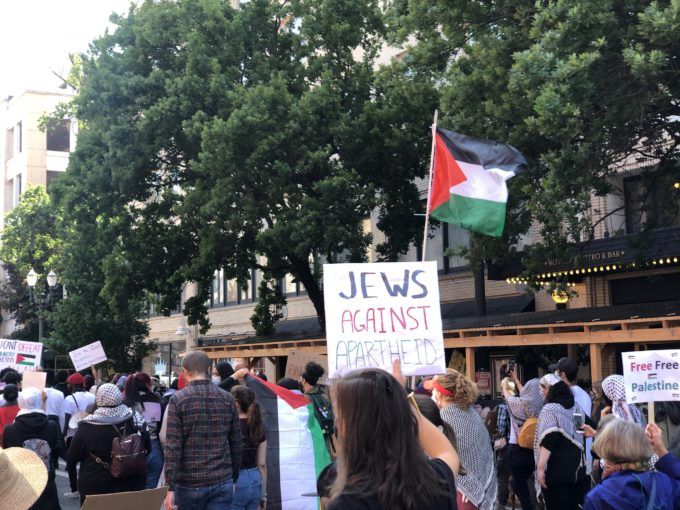
Photograph by Nathaniel St. Clair
Thousands of years of history is a lot to capture in one Jewish American Heritage Month, which is celebrated in May. But an old joke admirably condenses it into one sentence: “They tried to kill us, we survived, let’s eat.”
Passover is a perfect example of this sequence.
Always a favorite of mine, this spring holiday passed a few weeks ago. Across the country, Jewish families gathered to commemorate the story of the Jews’ escape from slavery in Egypt with beautiful food and well-worn prayers and songs. Chanting rapid-fire rounds of “Chad Gadya” with my family never gets old.
It’s full of resilience and joy — but increasingly, it also feels full of contradictions.
Like many Jewish holidays, Passover symbolizes the Jews’ reverence for freedom, how blessed we were to flee our bondage. But its many mentions of the ancient land of Israel can’t help but conjure the injustices of the modern Israeli state.
Earlier this year, Amnesty International released a comprehensive report concluding that Israel is committing the crime of apartheid against Palestinians. It’s not the first human rights organization to do so — Human Rights Watch and the Israeli groups Yesh Din and B’Tselem have all concluded the same.
These reports — and decades of grassroots advocacy — have made it impossible to deny modern Israel’s systematic discrimination against Palestinians.
Of course, in the wake of the Holocaust, millions of Jewish refugees needed a safe place to call home. But the land between the river and the sea was never the “land without a people for a people without a land” as it was described.
Since its establishment by force in 1948 — and especially its occupation of Palestinian territories since 1967 — Israel has demolished countless Palestinian homes to expand Jewish settlements. Millions of stateless Palestinians live under strict Israeli military control, while Palestinian citizens of Israel enjoy fewer rights than their Jewish counterparts.
For the 2 million Palestinians trapped in the Gaza strip, the daily denial of adequate water and electricity is compounded by the looming threat of Israeli bombing. In just 11 days of conflict this time last year, Israeli strikes killed up to 192 Gazan civilians, at least a third of them children.
These abuses stand painfully at odds with the Jewish history I know. Jewish people around the world should defend our heritage — and stand up against these violent injustices in our name.
For American Jews, that means demanding an end to U.S. military funding to Israel. As international human rights groupshave emphasized, the $3.8 billion the U.S. gives annually to Israel directly funds the advanced weaponry it uses, year after year, to control and oppress Palestinians.
Every other country in the world is subject to human rights laws restricting how U.S. arms and military support are used. We must apply the same rules to Israel.
The beautiful thing is, American Jewish history is full of advocacy like this. In 1969, hundreds of community members in Washington, D.C. — Jewish and non-Jewish, white and African American — joined together on Passover to commemorate the one-year anniversary of Dr. Martin Luther King, Jr.’s death.
This Freedom Seder wove together the histories of Jews, African Americans, and others who broke the chains of slavery. By reaching across communities it created strength, fortifying the ongoing movement for civil rights through age-old Jewish tradition.
We can, and must, do the same for Palestinians today. And at a time when far-right movements are on the rise in this country — threatening Jews, Muslims, immigrants, LGBTQ people, and other minorities — all of us need more than ever to join forces.
By choosing solidarity over fear, we can achieve not just freedom for some, but collective liberation for all. Like Moses with his staff, we can part the seas of oppression and move through them toward a brighter future, together.
And then, let’s eat.
Sarah Gertler is the Newman Fellow at the Institute for Policy Studies.